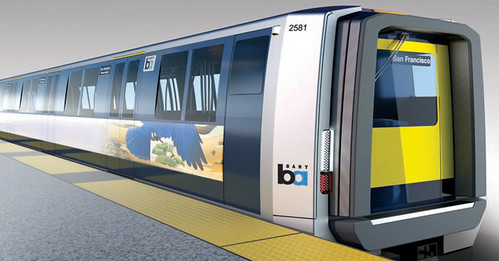
Commuters tired of BART’s carpet-lined compartments have a lot to look forward to in the coming years as the transportation service begins shopping for a firm to build new trains, though the consideration of foreign firms to construct the cars has caused some controversy.
The 40-year-old train car fleet will be completely replaced by one of three foreign firms over a 15 to 20-year period for $3.2 billion dollars, according to BART spokeswoman Luna Salaver. Eighty percent of the cost will be paid for by the federal government, and 20 percent by BART, Salaver said. BMW DesignworksUSA are making initial designs for the new train cars, designs which will be refined for engineering details, and manufactured by a car building firm overseas.
According to Salaver, BART solicited bids from firms through ads in international transit magazines. French firm Alstom, Canadian firm Bombardier, and Korean firm Rotem are the finalists being considered, and will be decided in March.
Although some might look upon hiring a foreign firm unfavorably in this time of financial crisis, SF State Assistant Professor of economics Lisa Takeyama said the employment of a firm outside of the U.S. is no surprise, as it is a consequence of the country’s ailing competitive market.
“The U.S. simply does not have a comparative advantage in producing these vehicles. The fact that none of the contract bidders were U.S. firms reflects that,” Takeyama said. “It would not be in our best long-term interest to subsidize or promote industries in which we have no competitive advantage.”
SF State civil engineering professor Ghassan Tarakji agreed that train building technology in other countries has surpassed that of the United States.
“We ignored trains for a long time, and so most companies ship away their train business,” said Tarakji, who specializes in transportation.
Additionally, BART intends to use federal funds to pay for the billion dollar project. Federal Transit Administration law stipulates the assembly must take place in the U.S., although priority cannot be given to a local manufacturer, according to Salaver.
“If BART intends to use federal funds to help pay for these much-needed new cars, we cannot give preference to a car builder who says they are going to assemble the cars in California or even the Bay Area,” Salaver said.
According to Salaver, companies that offer to use more than the required 60 percent domestic material will be given priority.
To those who would question the pricey overhaul of BART’s trains, Salaver assures the replacement is desperately needed.
“We do need to replace all of our trains. We have the oldest train car fleet in the nation,” Salaver said. “It’s not only harder to find replacement parts, it takes more time and labor to keep them running.”
Wherever they will be made, some commuters will welcome any improvements to the BART trains. Fransina Savusa, a senior studying political science, recalled an instance when she saw excrement on the train ground, and expressed support for newer replacement trains.
“It’s pretty gross,” said Savusa, who commutes on BART nearly every day for work and school. “It’s time for a change.”






